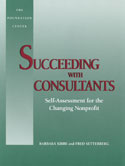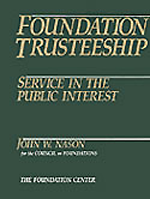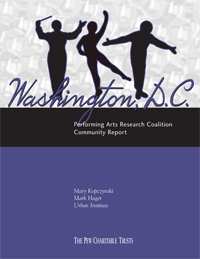Technical Assistance
— Foundation President
Remix: Making Art and Commerce Thrive in the Hybrid Economy
Penguin Press, 2008, 352 pages. ISBN-10: 1594201722
In late January GIA polled its 309 member organizations about their organization's responses to the economic downturn. 117 (38%) members responded, which provides a healthy sample of the membership.
Members reported their expected 2009 arts grantmaking would likely compare to 2008 as follows:
- 41% expected that 2009 would be the same as 2008.
- 13% expected that it would be reduced to 90% of 2008.
- 12% expected that it would be reduced to 80% of 2008.
- 11% expected that it would be reduced to 70% of 2008.
Grantees of foundations have little control over which program officer takes their case. Yet program officers make or break grantees' experiences with foundations. To trigger social change, foundations must give program officers better training, clearer expectations, and regular performance feedback.
Free online from Standford Social innovation Review
Read More...2004, 58 pages, Performing Arts Research Coalition, 1156 15th Street NW, Suite 810, Washington, D.C., 20005
Download:
Read More...This report focuses on two issues: (1) the usefulness of existing arts and culture data for the purposes of developing neighborhood indicators and (2) the ways in which art and culture are understood and valued at the neighborhood level by those who live and work there. Included are a discussion of the reconnaissance efforts, field work, workshops, pilot and case studies conducted; a review of existing arts and culture data collection practices and their usefulness for developing neighborhood indicators; and an analytical framework for identifying indicator types.
Read More...Ralph Smith, the 2007 Conference Chairman, issued a challenge in his welcome message – “that all who attend will leave with renewed energy, capacity and resolve to make a positive contribution toward meeting the challenges of our time.”
Read More...First Nations Development Institute and Native Americans in Philanthropy convened a group of Native philanthropic leaders in Minneapolis/St. Paul on September 14 2005, to discuss how we can better support the development of Native foundations and Native philanthropy. The objective of this meeting was to provide insight and input into the design and implementation of a structure to support the further development of Native foundations and Native philanthropy through technical assistance, advocacy and research.
Read More...
Authors Barbara Kibbe and Fred Setterberg explain how the appropriate use of consultants can generate exciting methods of forwarding your organization's goals.
Read More...
John Nason, drawing on years of experience as a trustee, guides foundation officials and their boards through difficulties and provides insights into critical areas of concern.
The Foundation Center, March 1989, 173 pp.
Available online from The Foundation Center.
Read More...
